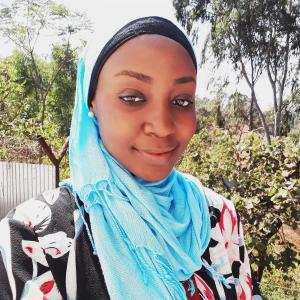Nihorimbere Gentile (16), is a Burundian refugee and a grade 8 student at Maendeleo Secondary School in Nyarugusu Refugee Camp, Tanzania. She was trained in sewing pads and on menstrual health and hygiene by her teachers at school as part of a program introduced in April 2021 by UNHCR, the UN Refugee Agency, that supports the production of local pads through its partner, the Norwegian Refugee Council (NRC).
NRC organised groups of 30 students from all the schools in the camp and trained these girls and their teachers on sewing local pads using scissors, towels, and nylon paper, materials provided by another UNHCR partner, the Danish Refugee Council (DRC).
Nihorimbere is using the skills she acquired in the training to teach her fellow students and friends at home. A skill that she is happy with and eager to share with others in her community.
“The menstrual education that I got at school came at the right time before my first period. I now know my menstrual cycle and menstrual hygiene, and I no longer miss school during my period. It is just a little discomfort, but it can be managed. I also taught five of my friends at home and I continue teaching other girls at school. I wish all girls around the world could have this kind of education, to feel safe and enjoy their time in school and at home,” says Nihorimbere.
A total of 210 girls and 42 teachers were trained in 10 primary schools in Nyarugusu Refugee Camp. These girls are teaching their peers how to sew reusable pads, which are then distributed free at schools to all girls of reproductive age, encouraging them to attend school during their menstrual period and be aware of their cycles.
Hafashimana Clodete (30), a Burundian refugee and teacher at Maendeleo Secondary School remarks on the importance of menstrual hygiene education as she remembers her life in Burundi, when she was at school in grade seven, “In my village there were no modern pads, we used pieces of cloth. One day, our teacher called one of the girls in my class to clean the board, when she stood in front of the class cleaning the board, a piece of cloth - which in essence was her sanitary pad - fell to the floor and the whole class witnessed this. Boys were laughing, even some of the girls. But most of us were not aware of what had happened to her as it was not traditional practice to educate girls on these things. The girl never showed up in the school again, she quit and dropped out of school and nobody cared.”
Hafashimana is happy to have been part of the UNHCR training program as she is in a vital and much needed position to educate girls on their menstruation cycles, what to expect, menstrual hygiene, pregnancy, and all issues related to menstruation and reproductive health. Something that she wished she knew when she was young.
“UNHCR has been supporting water, sanitation, and hygiene sanitary activities in the camp by initiating trainings for girls and supporting them with materials to make sanitary pads. While this initiative may not sufficiently cater to many, equipping them with skills will go a long way in their future, especially when they decide to return to their home countries,” explains Simon Peche, UNHCR's WASH Associate in Tanzania.
UNHCR’s menstrual hygiene program for forcibly displaced women and girls is possible thanks to the generous support of our steadfast donors like the Government of the United States of America. As of 30 September 2024, UNHCR received only 33% of the required USD 114.6 million needed to support refugees and asylum seekers in Tanzania. Due to dire underfunding, UNHCR was only able to distribute reusable sanitary pads two times this year, and the provision of soap which is critical to hygiene remains low. Thus, girls and women face further challenges in managing their menstrual health and hygiene.
As of 30th September 2024, Tanzania hosts a total of 232,813 refugees and asylum-seekers mainly from Burundi and the Democratic Republic of Congo, of which nearly a third are women and girls of reproductive age. More international support is needed to help girls like Nihorimbere and other refugees of reproductive age who are residing in camps.






